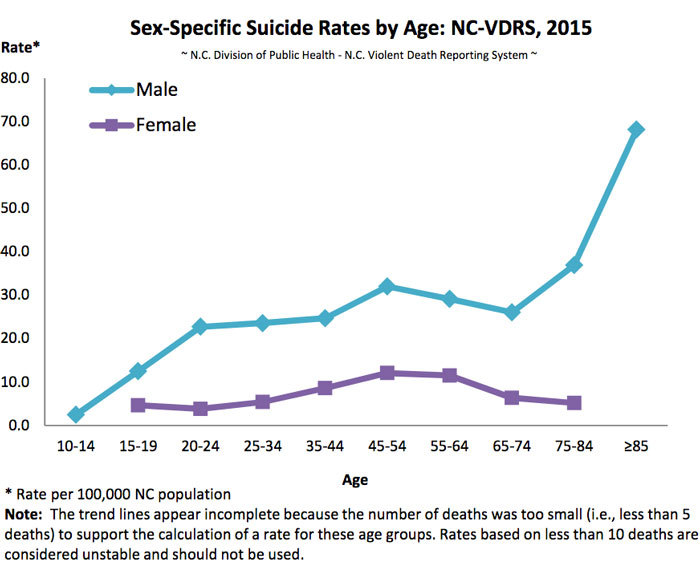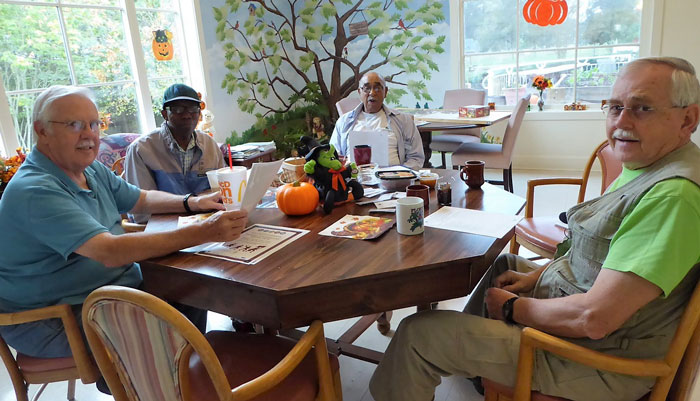Geezers, Gulpers, and Gardeners
- Need: Suicide rates among men age 65 and older have been rising in North Carolina. Challenges include losing friends, illnesses, and the loss of independence – all of which can lead to isolation and depression.
- Intervention: The Chatham County Council on Aging of North Carolina started Geezers, Gulpers, and Gardeners (3G Group) to connect retired men in need of male friends and mutual support.
- Results: Men in similar stages of life and varying backgrounds are forming friendships, engaging in activities, and taking care of their mental health.
Description
The North Carolina Injury and Violence Prevention Branch of the State Department reported that, while female suicide rates start to decline for those age 65 and older, rates for men in this age group sharply increased in 2015. Challenges for this population include losing friends, medical illnesses, and the loss of independence or identity. These challenges can often lead to isolation, doubt of self-worth, loneliness, and depression, all of which can negatively affect quality of life.
Elderly men may avoid bringing mental health concerns to a healthcare professional because of the perceived stigma that affects this demographic living in rural areas. Physical symptoms of mental distress can also be mistaken by medical professionals as typical signs of aging.

The Chatham County Council on Aging provides services, programs, and activities to older adults living in rural North Carolina to help maintain their independence and quality of life. In 2017, the Council developed Geezers, Gulpers, and Gardeners (3G Group) to keep elderly men connected with others their age and engage in mentally-stimulating activities. The idea for the group originated from one retired man's story. He moved to Pittsboro to be the caregiver for his wife who was diagnosed with dementia. As the only male who attended a caregiver support group hosted by the Chatham County Council on Aging, he expressed the desire to get to know other men in similar situations.
 The Council started the group that now
meets every Thursday morning at the
Eastern Chatham Senior Center in Pittsboro, North
Carolina. Most of the men drive themselves to the Center,
but assisted living facilities have offered rides for
residents who need it.
Laurels of Chatham, a skilled nursing and
rehabilitation center, provides food for the gatherings.
The Council started the group that now
meets every Thursday morning at the
Eastern Chatham Senior Center in Pittsboro, North
Carolina. Most of the men drive themselves to the Center,
but assisted living facilities have offered rides for
residents who need it.
Laurels of Chatham, a skilled nursing and
rehabilitation center, provides food for the gatherings.
Services offered
The 3G group is self-directed – the men in attendance decide on their own activity each week. Members have the opportunity to socialize with other men in similar life stages, whether they've lost a spouse, are taking care of their spouse, or are in need of male friends. Socializing happens around coffee, yard games, cards, or checkers. Sometimes, the men choose to draw "conversation starter" questions/topics from a basket to spur conversation and storytelling.
3G members are invited to participate in additional activities offered through the Eastern Chatham Senior Center, including wellness activities and classes.
Results
Through their efforts, the 3G group has grown in popularity among residents of Chatham County, with 6 regular members. Men with varying backgrounds – rural and urban roots, highly educated or less educated – have found common ground with one another through the 3G group and have formed new friendships.
The Chatham County Council on Aging has seen growing participation and leadership from 3G members in other events and groups like the Minor Home Repair Team, which repairs and enhances homes of seniors in Chatham County. There has been a growing number of men attending the Caregivers' Support Group and the Powerful Tools for Caregivers class. Several members have participated in Eastern Chatham Senior Center wellness activities, including the Mixed Artist & Craft Group, senior games, and the fitness center. Members have grown in friendship and get together for activities outside of the weekly 3G meeting or Chatham County Council on Aging events.
Overall, the group is having a positive effect on the mental health of its participants as they actively engage with the activities and opportunities provided.

Challenges
Advertising and reaching the target audience has been a challenge for the 3G Group. Coordinators have found that word of mouth works best. Differing political views has caused heated conversations, so the coordinators make "conversation starters" readily available to divert attention to more positive discussion.
Replication
To start a similar group for men, reach out to those who are already coming to your local senior center for other activities and notify your local assisted living facilities. Providing food is always a good way to attract people to your group. Promote the group through fliers, business cards, and other materials to hand out to potential participants.
Contact Information
Rodney Dietrich, Integrated Services Specialist / Social WorkerChatham County Council on Aging
919.542.4512 x231
rodney.dietrich@chathamcouncilonaging.org
Topics
Aging and aging-related services
· Elderly population
· Men
· Mental health
· Social connectedness
States served
North Carolina
Date added
September 11, 2018
Date updated or reviewed
September 7, 2022
Suggested citation: Rural Health Information Hub, 2022. Geezers, Gulpers, and Gardeners [online]. Rural Health Information Hub. Available at: https://www.ruralhealthinfo.org/project-examples/1031 [Accessed 15 April 2025]
Please contact the models and innovations contact directly for the most complete and current information about this program. Summaries of models and innovations are provided by RHIhub for your convenience. The programs described are not endorsed by RHIhub or by the Federal Office of Rural Health Policy. Each rural community should consider whether a particular project or approach is a good match for their community’s needs and capacity. While it is sometimes possible to adapt program components to match your resources, keep in mind that changes to the program design may impact results.
